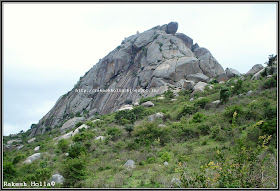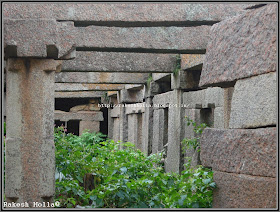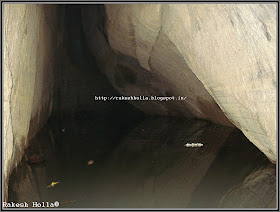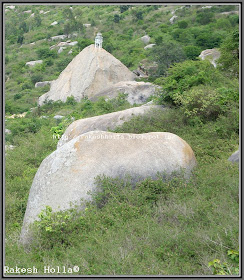Shivaganga hills is an
ancient religious and picnic centre situated about 60km from Bangalore on the way to Tumkur, it has a
monolithic black granite hill raising over 1380 meters above the sea level. The
cave temples on the hill dedicated to Gavi-Gangadhara (Shiva) and his consort
Swarnambha or Honna Devi are worshiped here. Gavi (kannada word) means cave. As
the temple is situated within a cave like structure it is called as
Gavigangadhareshwara. The inner sanctum is believed to be connecting to another
Shiva temple, Gavigangadhareshwara which is at Bangalore.
The place is just
fantastic, with breathtaking views from the high altitudes. Brilliant are the
views of the surrounding villages, the nearby Pushkarini or pond, from the top
of the hill. Most of the place is rocky, with railings to hold on to as you
climb, and monkeys to make sure you don’t take any offerings to the deity on
top!
The
devotees who travel to Shivaganga bring along with them the ghee to offer to
Lord Shiva. Shiva is in the form of Lingam at Gangadhareshwara temple. The
priest applies the ghee and rubs it all over the Shiva Lingam. Amazingly, one
can see the ghee turning back to butter, in front of them. Any answers to this
in our modern science? No one has the answer to why this amazing change occurs.
Lots of pilgrims travel to the place during their holidays just to watch the
miracle happen in front of them. The ghee that turns to butter has medicinal
properties in it.
You
will be amazed to see the beautiful natural spring at Patalaganga on your way
to the hilltop of Shivaganga. Inside some of the rocks, the underground spring
is seen seeping at the entrance. Water level of Patal Ganga sometimes comes up
to the knee height and is always cold. Water flowing is connected at Antargange
which is quite far from the spot. You could find some small fountains or water
bodies, that we were told, never dry up throughout the year!
Here
are many spots on the Shivaganga hill where spring water is seen. People
believe that spring water comes from the holy river Ganges.
Lord Shiva and the river Ganga (Ganges)
together are called by the name Shivaganga.
Olakallu Teertha is the spring water found on
the hillock. Pilgrims step down the narrow stairs between the rocks to see the
spring. People believe that only a pious person can get a touch or feel of the
water within. Myself and my bro Ani, one of them luckiest person who were
touched the water on that hole.
There is also a
Lord Ganesha temple and 108 Lingams near Agasthya theertha. Nandi is a monolith
placed atop on a huge rock. Beautiful scenery around can be seen from the top
of the rock. It is a peak spot of Shivaganga hills. People who travel to this
place during holidays should carry enough water because it is too hot on the
hills.
Sculptures
and carvings are seen on the walls and the pillars of the temple. Most of them
have succumbed to the weather conditions and negligence. A few paintings have
lost their heritage look after they were repainted. The only problem that travelers face is the menace of monkeys on the Shivaganga hills.
These hills have Ashtalingas (8
shivalingas) by name Gangadhareshwara along with consort Swarnambha,
Shantheshwara, Omkareshwara, Revana Siddheshwara, Kumbheshwara, Someshwara and
Muddu Veereshwara.
Ashta
Vrishabas (8 bulls) by name Nandi Vrishaba, Makara Basava, Mahisha
Basava, Gare Basava, Dodda basava, Kadale Basava, Giri Basava and Kodugallu Basava.
Ashta Theerthas
(8 sacred water springs) by name Agasthya Theertha, Shankara Theertha, Kanva Theertha, Kadamba Theertha, Maithla Theertha, Patala Gange, Olakallu Theertha
and Kapila Theertha.
Queen Shantala’s suicide point or Shanthala drop
is a spot which is 500 feet high from the foot of the hill. The Queen, at her
young age, always used to practice the dance in front of her deity, Honnadevi.
During King Vishnuvardhana’s reign, Shantala Devi had a great influence in the administration and religious reforms. King was a Vaishnava follower as he was
influenced by the saint Ramanujacharya, but Shantala was a follower of Jainism
Shantala was the Pattamaharani
(Queen who had right to sit on the throne).
Shantala was in a big depression as she couldn’t
give birth to a child who would become heir after King Vishnuvardhana. Only the
Pattamaharani’s son could become a legal successor according to the rule. When
Queen Shantala did not have children, the other queen Lakshmi was to be allowed
to become the Pattamaharani because she already had a boy baby. But the king
never agreed to this. He always believed that Shantala would give birth to a
son anytime, sooner or later. Shantala could not tolerate this for long. She
made up her mind to end her life near the temple of deity, Honnadevi.
So, one night when everyone at the palace was
fast asleep she rode on a horse and reached Shivaganga. After she prayed at the
temple, she jumped from the hill to end her life. She was in her early twenties
when she died. It is also said that Queen Shantala Devi died after observing
the Jaina practice of Sallekhana (fasting unto death) at Shivaganga.
On some days
during the night, localities moving around near the Shantala drop have heard
the sound of a woman's anklets. Even to this day, they believe that her
restless soul wanders at this place, with deep sorrow.
Lord Shiva’s
consort Honnadevi also a deity in the nearby temple. Queen Shantala of the
Hoysala dynasty was a great devotee of goddess Honnadevi. Patala Ganga, the
natural spring water is situated between the two temples.
During
the reign of Hoysala rulers, King Vishnuvardhana had contributed a lot for the
renovation of the Shivaganga temple. Later Kempegowda too had built a beautiful
tower over the temple and renovated it again.





 =
=































Good One Rakesh..so from westernghats..you landed to bayalu seeme...good write up on history and the mistory of shivagange
ReplyDeleteNice post and photos. Yet to visit the place.
ReplyDeletewww.rajniranjandas.blogspot.com
Nice one... I wish you are always luckiest person... Hats up for your efforts....
ReplyDeleteThanks to all...!!
ReplyDeleteThis comment has been removed by the author.
ReplyDeleteThis comment has been removed by the author.
ReplyDeleteNice Post i loved it.Thanks for sharing such a nice place i am amazed.
ReplyDeletehey blogger thanks for this nice information about Trekking.
ReplyDeleteExcellent, what a Tremondious website it is! This webpage provides good information about that place to us, keep it up.
ReplyDeleteShakuntala Tours and Travels
Wow 😲 information is very useful...thanks alot
ReplyDeleteNice blog. Tumkur is a dream destination for anyone on a religious pilgrimage. Moreover, there are many adventure spots such as rock climbing, boating, trekking et al in Tumkur district for the young as well. You can checkout many places to visit in tumkur.
ReplyDelete
ReplyDeleteNice one. I would love to visit this place. Check out pench hotels booking also.You will get exclusive places.
Hi,
ReplyDeleteHere's a link to my video and blog related to Shivagangae hill . I believe, this would help you
https://www.youtube.com/watch?v=jlmD0Ezf0fQ&t=25s
http://silentrider.in/2017/01/31/shivaganga-hill/
Please let me know if it helps you,
Regards,
Silent rider
Awesome pictures, thanks for sharing your wonderful experience. I really loved reading thiz blog. Book your tickets in SRSTravels and enjoy your trip.
ReplyDeleteToday I read this article,
ReplyDeleteExcellent narration and beautiful pictures.
It showed your interest.
I felt very happy.
When I am reading, I am feeling that I was in Sivagange.
Thank you very much for your good information and photographs.
Vijayanthi,
Vijayawada
Wonderful post! thanks for this lovely post. Loved reading this post. Well written with lovely images. Want to explore those place then book your bus tickets in advance with exciting Bus Ticket offers.
ReplyDelete